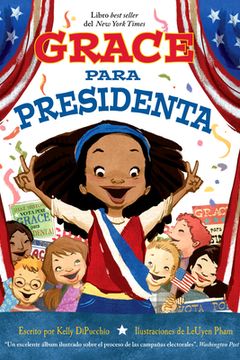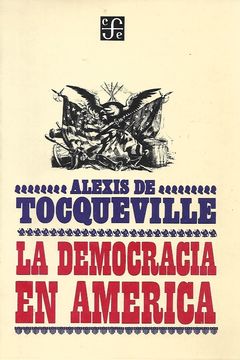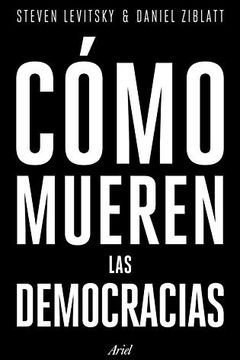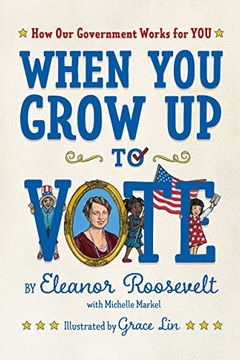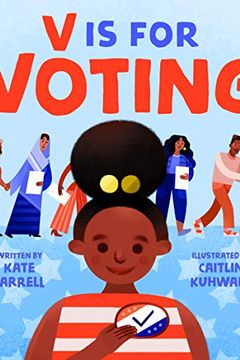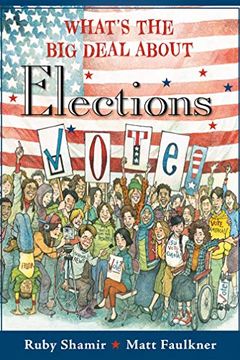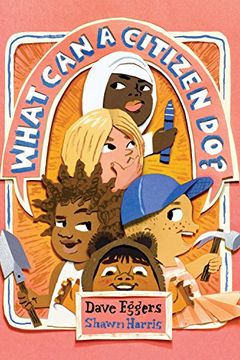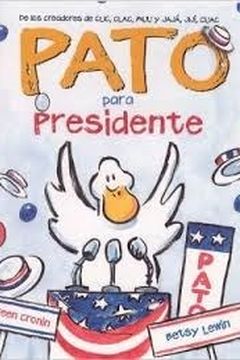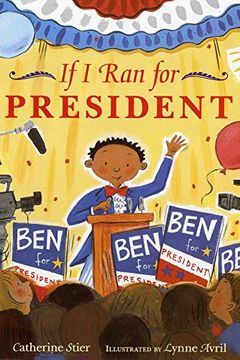Mejores libros sobre democracia
Explora los fundamentos de la libertad con los mejores libros sobre democracia, recopilados de blogs y publicaciones autorizadas, ordenados por su prominencia en reseñas de expertos.
92 libros en la lista
Ordenar por
Cantidad de artículos
Diseño
When Grace's teacher reveals that the United States has never had a female president, Grace decides she wants to be the nation's first and immediately jumpstarts her political career by running in her school's mock election! But the race is tougher than she expected. This timely story not only gives readers a fun introduction to the American electoral system but also teaches the value of hard work, courage, independent thought--and offers an inspiring example of how to choose our leaders.
Presentado en 4 artículos
Pocos libros han ejercido influencia tan notable en nuestro pensamiento constitucional y político como La democracia en América de Alexis de Tocqueville. Editada en París por vez primera en 1835, hizo célebre a su joven autor, que fue saludado de inmediato como heredero del barón de Montesquieu, por su penetrante observación, por su elegancia y por la serenidad de su juicio. Así, pues, no es de extrañar que Dilthey hubiera dicho años más tarde que Tocqueville era "el mayor pensador político desde Aristóteles y Maquiavelo".
Dos son los temas de La democracia en América: las instituciones norteamericanas como expresión de las costumbres y, en general, el estilo de vida de los Estados Unidos y los principios en que se basa un Estado democrático. La parte inicial de la Democracia desarrolla el primer tema. En ella se describe el funcionamiento de los tres poderes de la Unión: la estructura de los tribunales y los fundamentos del poder judicial, los cuerpos legislativos y la organización del poder ejecutivo federal, introducidos por el análisis de la Constitución federal. Se examina el sistema bipartidista y la importancia de las asociaciones, el poder de la mayoría y sus efectos. Esa parte termina con una serie de capítulos dedicados a considerar la influencia de las costumbres y de la religión en el mantenimiento del sistema democrático: "Los clérigos norteamericanos no pretenden atraer hacia la vida futura, sino que abandonan voluntariamente una parte de su corazón a los cuidados de la presente, y se diría que consideran los bienes del mundo como objetos importantes, aunque secundarios. Si no se asocian a la industria, se interesan al menos en su progreso y lo aplauden, y mostrando constantemente a los fieles la fidelidad al otro mundo como el gran objetivo de sus temores y esperanzas, nunca les prohíben que busquen honradamente el bienestar en éste."
En la segunda parte está trazada toda la teoría del Estado democrático que constituye la gran aportación de Tocqueville, su filosofía política. El hecho generador de la nueva ciencia política se encuentra, dice Tocqueville, en la igualdad de condiciones que priva en la sociedad norteamericana. La igualdad es la causa; la libertad el efecto: "No difiriendo entonces ninguno de sus semejantes, nadie podrá ejercer un poder tiránico, pues, en este caso, los hombres serán perfectamente libres, porque serán del todo iguales y serán perfectamente iguales, porque serán del todo libres."
A más de cien años de distancia de sus primeras ediciones, la vigencia de La democracia en América sigue demostrando su indiscutible actualidad de libro clásico de la ciencia política, su valor de libro de siempre. Nuestra edición consta de un prefacio, notas y bibliografía comentada de J. P. Mayer -director de la edición de las obras completas de A. de Tocqueville-; de un estudio introductorio de Enrique González Pedrero y de un apéndice que contiene la relación de las ediciones anteriores.
Presentado en 4 artículos
Recomendado por
Patrick Collison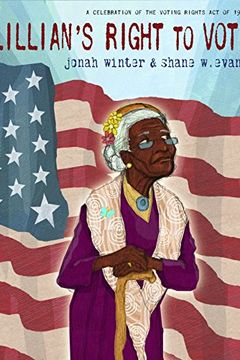
Lillian's Right to Vote
A Celebration of the Voting Rights Act of 1965
African American woman Lillian, 100, recalls her family’s history of voting rights as she makes her way to the polling place. She sees her great-grandfather voting for the first time after the Fifteenth Amendment's passage, her parents trying to register, and herself protesting from Selma to Montgomery. In this picture book, Jonah Winter and Shane W. Evans powerfully recall America’s civil rights battle and the importance of every voice.
Presentado en 4 artículos
Un libro que ha encabezado la lista de los más vendidos en Estados Unidos.
La aparición de distintos ejemplos de populismo en diferentes partes del mundo ha hecho salir a la luz una pregunta que nadie se planteaba unos años atrás: ¿están nuestras democracias en peligro? Los profesores Steven Levitsky y Daniel Ziblatt, de la Universidad de Harvard, han invertido dos décadas en el estudio de la caída de varias democracias en Europa y Latinoamérica, y creen que la respuesta a esa pregunta es que sí.
Desde la dictadura de Pinochet en Chile hasta el discreto y paulatino desgaste del sistema constitucional turco por parte de Erdogan, Levitsky y Ziblatt muestran cómo han desaparecido diversas democracias y qué podemos hacer para salvar la nuestra. Porque la democracia ya no termina con un bang (un golpe militar o una revolución), sino con un leve quejido: el lento y progresivo debilitamiento de las instituciones esenciales, como son el sistema jurídico o la prensa, y la erosión global de las normas políticas tradicionales. La buena noticia es que hay opciones de salida en el camino hacia el autoritarismo y los populismos de diversa índole.
Basándose en años de investigación, los autores revelan un profundo conocimiento de cómo y por qué mueren las instituciones democráticas. Un análisis alarmante que es también una guía para reparar una democracia amenazada por el populismo.
Presentado en 3 artículos
This iconic book by Eleanor Roosevelt has been revised and updated for a contemporary audience. "When You Grow Up to Vote" explains to young people how our government is designed to work, from local to national stages. With updated information and bold art from award-winning artist Grace Lin, this book is a must-read for parents and teachers looking to teach children about citizenship and the importance of voting.
Presentado en 3 artículos
Explore concepts of democracy and civil rights with in V Is for Voting, a playful ABC book that reminds readers that every vote counts! With engaging rhyming text and bold illustrations, this book introduces progressive families to concepts like social justice and activism. Perfect for fans of A Is for Activist, Woke Baby, and Feminist Baby, V Is for Voting is a crucial addition to every young reader's library.
Presentado en 3 artículos
Discover the importance of elections in this informative and fun-filled chapter book! From local elections to national races, "we the people" get to decide who runs the show. Get ready to be amazed by fascinating facts about US government and elections, including the sheer number of state and local governments, early Election Day celebrations, and George Washington's unique presidency. With a simple but powerful message, this book reminds readers that everyone can play a part in shaping our future through elections.
Presentado en 3 artículos
Discover how children turn a lonely island into a community and explore the power of small actions in shaping a better world. Follow the journey from what the world should be to what it could be, as connected actions by different children come together in this inspiring read.
Presentado en 3 artículos
In this third installment of the travails of Farmer Brown, Cronin and Lewin take on the electoral process in this age of recounts and late night talk show appearances. Duck is tired of doing his chores on the farm so he decides to run for election and oust Farmer Brown. In his new position, Duck realizes that managing the farm is too much work so he decides to run for governor. Eventually Duck heads back to the farm to write his memoir and rest on his laurels. This book will charm and inform readers of all ages.
Presentado en 3 artículos
Running for the highest office in the land is no easy feat, but this engaging children's book takes young readers through the process step by step. From analyzing national issues to debating opponents, If I Ran For President provides an accessible and informative guide to what it takes to run for president. Complete with colorful illustrations, this book is a must-read for any aspiring future leaders.
Presentado en 3 artículos
Democracy in Hard Places by Scott Mainwaring
Asi que quieres ser Presidente by Judith St. George
From Development to Democracy by Dan Slater, Joseph Wong
Por qué estamos polarizados by Ezra Klein
Sobre la tiranía by Timothy Snyder
Orden y decadencia de la política by Francis Fukuyama
El pueblo contra la democracia by Yascha Mounk
Breaking the Two-Party Doom Loop by Lee Drutman
Let them Eat Tweets by Jacob S. Hacker
Democracy and Dictatorship in Europe by Sheri Berman
El liberalismo y sus desencantados by Francis Fukuyama
Contra las elecciones by David van Reybrouck
PEOPLE VS TECH, THE by J. Bartlett
Winner-Take-All Politics by Jacob S. Hacker
Grace va a Washington by Kelly Dipucchio
We The People by Aura Lewis
Civil Resistance by Erica Chenoweth
If I Were President by Catherine Stier
Ill Winds by Larry Jay Diamond
Around America to Win the Vote by Mara Rockliff
Vote for Me! by Ben Clanton
Backsliding by Stephan Haggard
The Politics of Institutional Weakness in Latin America by Daniel M. Brinks
The Revolutionary City by Mark R. Beissinger
The Anti-Oligarchy Constitution by Joseph Fishkin, William E. Forbath
Caída y ascenso de la democracia by David Stasavage
Uncounted by Gilda R. Daniels
Democracy Erodes from the Top by Larry M. Bartels
Resisting Backsliding by Laura Gamboa
The Problem of Democracy by Shadi Hamid
Reset by Ronald J. Deibert
A World Safe for Democracy by G. John Ikenberry
El ocaso de la democracia by Anne Applebaum
El Proyecto 1619 by Nikole Hannah-Jones
Tightrope by Nicholas D. Kristof
La tiranía del mérito by Michael J Sandel
La era del capitalismo de la vigilancia by Shoshana Zuboff
Capital e ideología (Deusto) by Thomas Piketty
The Hidden History of Burma by Thant Myint-U
La luz que se apaga by Stephen Holmes Ivan Krastev
La revancha de los poderosos by Moisés Naím
The Upswing by Robert D. Putnam
La manipulación de la verdad by Peter Pomerantsev
Una breve historia de la igualdad by Thomas Piketty
Four Threats by Suzanne Mettler, Robert C. Lieberman
Votos, Drogas y Violencia. La lógica política de las guerras criminales en México by Guillermo Trejo, Sandra Ley
Become America by Eric Liu
Las crisis de la democracia by Adam Przeworski
Open Democracy by Hélène Landemore
Politics and Expertise by Zeynep Pamuk
The Autocratic Middle Class by Bryn Rosenfeld
Understandings of Democracy by Jie Lu, Yun-han Chu
Religion and Brazilian Democracy by Amy Erica Smith
Ruling by Other Means by Grzegorz Ekiert
Neoliberal Resilience by Aldo Madariaga
After Repression by Elizabeth R. Nugent
Shock to the System by Michael K. Miller
Land, the State, and War by Jennifer Brick Murtazashvili, Ilia Murtazashvili
Assault on Democracy by Kurt Weyland
Populism and Liberal Democracy by Takis S. Pappas
La ultraderecha hoy (Estado y Sociedad) by Cas Mudde
Revolution and Dictatorship by Steven Levitsky, Lucan Way, Joe Barrett, Tantor Audio
Why Cities Lose by Johnathan A. Rodden
Modi's India by Christophe Jaffrelot
Muertes por desesperación y el futuro del capitalismo by Anne Case, Angus Deaton
Memes to Movements by An Xiao Mina
Technopopulism by Christopher J. Bickerton, Carlo Invernizzi Accetti
El gran experimento by Yascha Mounk
A Lot of People Are Saying by Nancy L. Rosenblum, Russell Muirhead
La democracia by Robert A. Dahl
The Civic Culture by Gabriel Abraham Almond
Democracy by Petition by Daniel Carpenter
Democracies and International Law by Tom Ginsburg
Democracy Rules by Jan-Werner Müller
After Democracy by Zizi Papacharissi
Migration and Democracy by Abel Escribà-Folch, Joseph Wright, Covadonga Meseguer
The Emergence and Revival of Charismatic Movements by Caitlin Andrews-Lee
Campaigns and Voters in Developing Democracies by Noam Lupu
Europe's Burden by Alina Mungiu-Pippidi
Freedom by Nathan Law
Conservative Party-Building in Latin America by James Loxton
The Moral Economy of Elections in Africa by Nic Cheeseman, Gabrielle Lynch, Justin Willis
